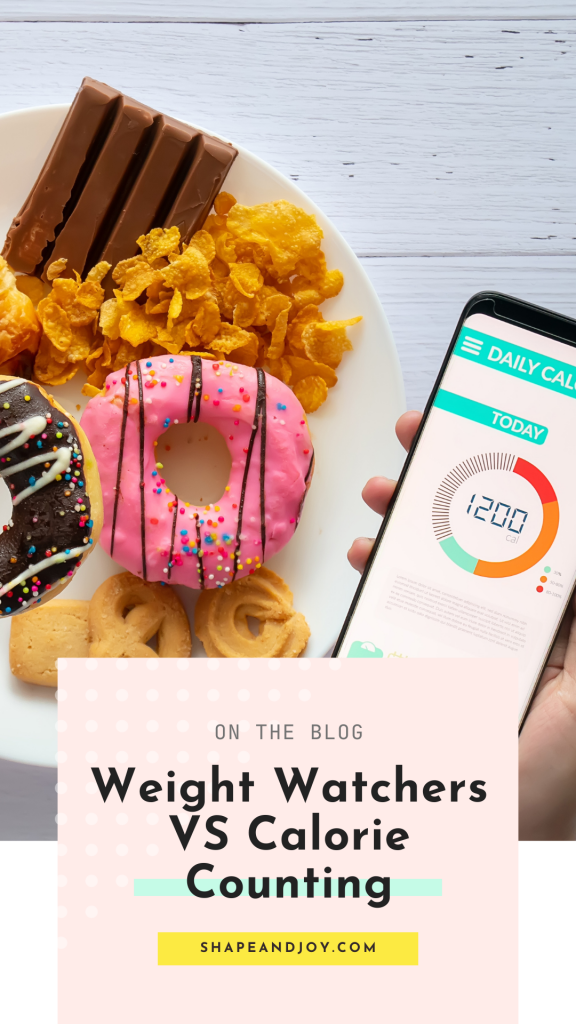This post may contain affiliate links, which means that I may earn a commission if you click on the link or make a purchase using the link. When you make a purchase, the price you pay will be the same whether you use the affiliate link or go directly to the vendor’s website using a non-affiliate link.
Introduction
Losing weight is a journey that demands dedication, consistency, and patience. But, the first step towards success is choosing the right method of tracking your food intake. With so many options available, it can be overwhelming to decide where to start. In this post, I wanted to explore two popular methods: Weight Watchers Points and calorie counting.
Understanding their differences can help you pick the method best suited to your lifestyle and goals. And my own experience of tracking both for one week.
LEARN MORE ABOUT MY WEIGHT LOSS JOURNEY! > How I Lost Over 80lbs: Tips For Starting A Weight Loss Journey

Table of Contents
- Introduction
- How Does Weight Watchers Work?
- Pros and Cons of Using Weight Watchers Points
- Understanding Calorie Counting
- Pros and Cons of Calorie Counting
- Making the Most of Your Chosen Method
- Putting Weight Watchers to the test
- Conclusion
How Does Weight Watchers Work?
Weight Watchers assigns a point value to each food based on its nutritional information, including calories, protein, sugar, and fat. The goal is to stay within your daily point allowance, which is determined by your weight, height, age.
Using Weight Watchers Points can offer a more flexible approach to dieting as it allows for indulgences, as long as they fit within your points. Additionally, Weight Watchers offers a community aspect, with meetings and online support groups, which can provide accountability and motivation.
However, some people may find tracking their points to be time-consuming and tedious. Additionally, the point system may not accurately reflect the nutritional value of certain foods, such as those high in healthy fats.
No matter which method you choose, keeping nutrition simple is the way to go. I’ve broken down easy ways to stay on track in Simplify Nutrition With These 5 Easy Tips.
Pros and Cons of Using Weight Watchers Points
Pros of Weight Watchers
- Flexible and customizable meal plans
- Access to a supportive community of fellow members and coaches
- Encourages healthy eating habits and portion control
- Offers a variety of resources and tools, including an app and online support
- Can lead to long-term weight loss success
Cons of Weight Watchers
- Requires a membership fee
- Can be time-consuming to track points and plan meals
- Some people may find the point system confusing or restrictive
- May not be suitable for those with certain dietary restrictions
- Doesn’t set you up for lifetime success, post weight loss
Understanding calorie counting can be an alternative method for tracking your food intake. By counting calories, you have a clearer picture of the nutritional value of the foods you eat, which can be helpful for achieving specific weight loss or health goals.
POSTS YOU MAY BE INTERESTED IN:
Understanding Calorie Counting

Understanding calorie counting can illuminate a detailed view of your food intake. Counting calories is a popular method for tracking nutrition, and is the most accurate way to track food intake and ensure you are in a calorie deficit.
It involves monitoring the number of calories you eat and drink each day to maintain, gain, or lose weight. To start calorie counting, you need to determine your daily calorie needs (TDEE) based on your age, gender, weight, height, and activity level. Once you have this number, you can use a food diary or an app to track the calories in the foods and drinks you consume. Keep in mind that not all calories are created equal, and it’s important to focus on eating a balanced diet that includes a variety of nutrients.
In the debate between Weight Watchers Points and calorie counting, there is no one-size-fits-all answer. What’s best for you depends on your personal preferences and goals. By understanding the benefits and drawbacks of each method, you can make an informed decision that fits your unique needs.
Pros and Cons of Calorie Counting
Pros of Calorie Counting
- Most accurate in creating a calorie deficit
- Provides awareness and education about the calorie content of food
- Can help you make healthier food choices
- Full flexibility and nothing off limits
Cons of Calorie Counting
- Can be time-consuming and tedious to track every calorie consumed
- May create an unhealthy focus on numbers rather than on overall health and nutrition
- Can be inaccurate, as calorie counts on food labels may not be completely reliable
- Can lead to disordered eating patterns or even eating disorders in some individuals.
If calorie counting is stressing you out, it might be time to rethink it. I go deeper into why this method may not always work in my post on The Downside of Calorie Counting.
POSTS YOU MAY BE INTERESTED IN:
Making the Most of Your Chosen Method

Once you have decided on the weight loss method that suits you best, the next step is to make the most of it. Whether you choose to follow Weight Watchers Points or calorie counting, there are strategies you can use to optimize your weight loss journey.
- Plan your meals and snacks in advance. This will help you make healthier choices and avoid impulsive eating. You can use meal planning apps, websites or journals to create a weekly menu and grocery list
- Be mindful of your portion sizes. This is especially important with Weight Watchers, as you can still overeat 0 point foods. Use measuring cups, spoons, or a food scale to ensure that your portions are accurate.
- Focus on nutrient-dense foods. Both Weight Watchers Points and calorie counting allow you to eat anything you like, as long as you stay within your daily allowance. However, it’s more beneficial to choose foods that are low in calories and high in nutrients, like fruits, vegetables, whole grains, and lean proteins.
- Incorporate physical activity into your routine. Exercise is an essential component of weight loss and overall health. It can help you burn calories, reduce stress, and improve your mood.
- Practice the 80/20 rule along with your chosen method – 80% of your food intake should be whole-nutrient dense, and save the more “unhealthy” treats for the 20%
Finally, stay consistent and patient. Weight loss is not a quick fix, and it takes time and effort to achieve sustainable results. Don’t get discouraged by setbacks or plateaus. Remember why you started and focus on your progress, no matter how small!
Whichever plan you choose, setting smart goals is key to your success. Learn how to create realistic goals in my post on Smart Weight Loss Goals.
POSTS YOU MAY BE INTERESTED IN:
Putting Weight Watchers to the test
I think the ultimate questions of Weight Watchers is, with so many 0 point foods, how easy is it to stay in a calorie deficit? Let’s find out!
I spent the week using the WW app and following the SmartPoints® system, but then logging all of my calories at the end of the day – I did it this way so that I wouldn’t be influenced throughout the day by counting calories as well.
The Purple plan I was on allowed for 16 SmartPoints® everyday, plus 42 weekly SmartPoints®.
The weekly SmartPoints® are there so there is a bit more flexibility, so if I go over the 16 daily points, they will come out of the weekly budget. There is also a rollover feature where any unused SmartPoints® will get added to the weekly budget, but this caps off at 4 – anymore unused SmartPoints® will be lost.
The way I worked out my daily calorie goal was by working out my BMR & TDEE based on height, weight and activity levels. My TDEE was 2200, and my goal is to lose 1lb a week. To achieve this I needed to be in a 500 calorie deficit everyday – so my daily calorie intake need to be around 1700.
I was fairly surprised to learn I was actually under my calorie goals following Weight Watchers, every single day! In total for the week I was 1831 calories under my goal and at an estimated calorie deficit of 5331 which would put me roughly around a 1.5lb loss for that week. Which is actually exactly what I lost.
POSTS YOU MAY BE INTERESTED IN:
Conclusion
In summary, when it comes to Weight Watchers Points vs calorie counting, there is no one-size-fits-all answer. Both methods have their pros and cons, and the choice ultimately depends on your personal preferences and lifestyle. Experiment with each method and track your progress along the way. Remember to be patient, consistent, adaptable and take the advice of this post into account!
A one week test on one person isn’t really conclusive evidence that Weight Watchers would result in a calorie deficit.